June 17, 2015
Nobody ever believes in love
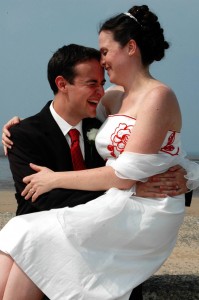 Nobody ever believes in love. I certainly didn’t. Ten years ago right now, the day before my wedding, when my husband-to-be and his mum were running errands in their town, they ended up waiting for ages at the bank. I was at home waiting for them to come back, and when they didn’t, I started to feel sick to my stomach. It was terrible. I was convinced that halfway there they’d had a heart-to-heart, and Stuart had confessed he didn’t want to go through it all, and now they were driving around in circles trying to come up with the kindest way to let me down. I was convinced of this not because I lacked faith in Stuart or in our relationship, but because it just seemed too easy, too simple, too lucky, that our wedding, our marriage would transpire. Because there were no flies in the ointment (except that we were both of us unemployable, and neither descended from moneyed stock, sadly).
Nobody ever believes in love. I certainly didn’t. Ten years ago right now, the day before my wedding, when my husband-to-be and his mum were running errands in their town, they ended up waiting for ages at the bank. I was at home waiting for them to come back, and when they didn’t, I started to feel sick to my stomach. It was terrible. I was convinced that halfway there they’d had a heart-to-heart, and Stuart had confessed he didn’t want to go through it all, and now they were driving around in circles trying to come up with the kindest way to let me down. I was convinced of this not because I lacked faith in Stuart or in our relationship, but because it just seemed too easy, too simple, too lucky, that our wedding, our marriage would transpire. Because there were no flies in the ointment (except that we were both of us unemployable, and neither descended from moneyed stock, sadly).
“Marry a good man,” answered Anne Enright in this weekend’s Globe and Mail Books to the question, “What the best advice you’ve ever received?” And I did. Ten years on, it only becomes more clear.
I still don’t believe it totally. Perhaps the problem is that I’ve spent my life reading fiction. It occurred to me as I contemplated writing this post that it would be very novel-like (i.e. the way that life goes) if three days from now by husband told me he didn’t love me anymore and was leaving me for somebody whose forehead wasn’t perma-wrinkled and rashy, maybe some whose abs were less rippled than mine (by which I mean rippling in the breeze, of course). Years ago, I read a line from an article about divorce—”‘Barring some catastrophe,’ Bonnie says, placing a hand on her husband’s khaki-clad knee. ‘We are going to have a successful lifelong marriage.'”—and it turned out I knew of Bonnie, though by the time I came across the article, she was already divorced. I don’t know if there was any catastrophe. But still. I am so fascinated by declarations of undying love and gratitude in the acknowledgements pages of backlist books by authors whom I know to be no longer attached. “To Pablo, my everything. It begins and ends with you.”
So I don’t know. But here is what I do know: ten years ago I married a good man, and I love him more and more all the time. And more than that, I like him. He is my choicest companion for any endeavour, from the Valentines we spent in the hospital ER while our three-year-old had an enema to dreamy vacations far across the sea. He is kind and patient and fun, smart and interesting. Everything good that I have ever made has been co-conspired by him. He is supportive, hilarious, imaginative, good, hard-working, generous, and adorable. I am absolutely nuts for him, and really, I could adjectivise him all day. And he loves me back. He doesn’t just say it, but he shows it. Simple, easy, lucky. Can you see why I’m not sure?
I worry about writing down these things in case I come across as more irritatingly smug than I usually do, if such a thing is possible. But in not writing it down, a different kind of narrative takes hold. The kind that presumes that it is not possible to be married to someone for ten years and to love them more and more all the time. That marriage is a sham, it doesn’t work, that everyone is cheating, or longing to. Which is so far from my experience, in which my marriage is the bedrock of my entire life. Solid ground, I think. The surest thing I know.
Or do I? I think so. But it’s a kind of faith, marriage, believing in somebody else, believing in oneself even. That’s all it is, but then it’s everything. It’s all we’ve got, but then there’s all we’ve got—with a focus on the muchness. Ten years ago, we had no idea. We were two weeks away from moving to Canada, making a start here, I was embarking on graduate school, Stuart applying for permanent residency. The year we got married and the year after that, we lived on groceries from No Frills, $50 a week, mostly chickpeas because we couldn’t afford meat, and things made from soup mixes because we didn’t know how to cook. But we learned. It was such a long time ago.
 But things started to happen, the way they do when you start leaving your twenties behind. We figured out what we wanted to do and how to do it. We decided what our priorities were going be. It wasn’t all uphill—there were job losses, plenty of failure and disappointment, stupidity, illness, and mistakes. But all these things are better weathered together, and we’re better for them. Better for having kids too, our amazing daughters who are even harder to believe in than love is, because how can the world really be capable of such miracles as that? Life begetting life, first principles, but I don’t get it at all. All this extraordinary amazement at the most ordinary things, and when I look back on the last decade it overwhelms me. It makes me think there is no such thing as ordinary after all.
But things started to happen, the way they do when you start leaving your twenties behind. We figured out what we wanted to do and how to do it. We decided what our priorities were going be. It wasn’t all uphill—there were job losses, plenty of failure and disappointment, stupidity, illness, and mistakes. But all these things are better weathered together, and we’re better for them. Better for having kids too, our amazing daughters who are even harder to believe in than love is, because how can the world really be capable of such miracles as that? Life begetting life, first principles, but I don’t get it at all. All this extraordinary amazement at the most ordinary things, and when I look back on the last decade it overwhelms me. It makes me think there is no such thing as ordinary after all.
You never know what’s around the corner, though I think that’s a blessing far more than a curse. “To me, the grounds for hope are simply that we don’t know what will happen next,” writes Rebecca Solnit in her essay, “Woolf’s Darkness,” which is also an epigraph of my novel. (The other epigraph is from Harriet the Spy.) And while I could never have forecasted the past ten years in my wildest dreams, I think I would have hoped for them, if I’d dared to. For our incredible fortune, by which I mean Stuart and me, and that we found each other at all in a world so big and swarming with other people.
March 19, 2015
A sign of spring
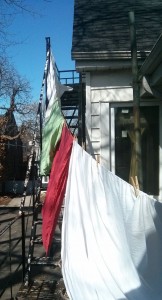 I love the springs that arrive like this, like an unexpected gift instead of something long overdue. Spring is not quite here yet, but it’s making itself known, the way the green of a crocus appears like a dot in the dirt (and the way a tooth first appears, a dot of white on a baby’s gum—this is my metaphor lately). There are no leaves on the trees and the air still has a chill, but look how the sky is blue, the snow is gone, and our household’s sheets are drying on the line.
I love the springs that arrive like this, like an unexpected gift instead of something long overdue. Spring is not quite here yet, but it’s making itself known, the way the green of a crocus appears like a dot in the dirt (and the way a tooth first appears, a dot of white on a baby’s gum—this is my metaphor lately). There are no leaves on the trees and the air still has a chill, but look how the sky is blue, the snow is gone, and our household’s sheets are drying on the line.
Though the surest sign that it isn’t spring (yet) is how cold were my hands after hanging out the sheets. Soon though…
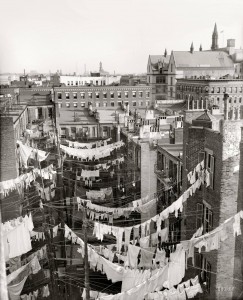 I was inspired to hang out the sheets from Sarah’s blog post about hanging out her washing (and her comments on the magical high-up washing lines with pulleys that need to be hauled in and out—I dream of these, though they terrify me also. What if something comes loose and my pillowcase falls down six stories, lost forever). It strikes me what a literary thing is clothes on the line—indeed, as I was hanging the sheets this morning, the “Grandma hanging washing on the clotheslines to be dried” line kept bouncing through my head from Peepo.
I was inspired to hang out the sheets from Sarah’s blog post about hanging out her washing (and her comments on the magical high-up washing lines with pulleys that need to be hauled in and out—I dream of these, though they terrify me also. What if something comes loose and my pillowcase falls down six stories, lost forever). It strikes me what a literary thing is clothes on the line—indeed, as I was hanging the sheets this morning, the “Grandma hanging washing on the clotheslines to be dried” line kept bouncing through my head from Peepo.
For more on literary washing, do read Anita Lahey’s blog post, “Oh, let there be nothing on earth but laundry.” (Lahey had a poem included in the anthology, Washing Lines, a collection of poetry of laundry and washing.) And see also Matilda Magtree (Carin Makuz) with “Pinning, Pining and Penning,” about repairing clothespins and other essential acts.
January 27, 2015
A Remarkable Cat
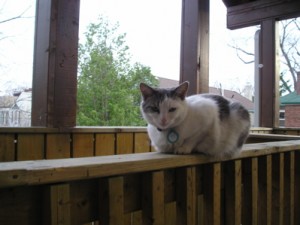 One day in 2008, not long after we’d moved into our apartment, my friend Rebecca came over, and a small grey and white cat walked in right behind her. “Do you know that cat?” Rebecca asked, not sure. It was her first visit to our new place. The cat seemed friendly enough, and remarkably at home. I checked her collar and saw that her address was next door, the other side of our semi-detached house, the home of our landlords. “That’s your cat?” I asked them the next time I saw them. “She likes to come visit,” they told us. “I hope you don’t mind.”
One day in 2008, not long after we’d moved into our apartment, my friend Rebecca came over, and a small grey and white cat walked in right behind her. “Do you know that cat?” Rebecca asked, not sure. It was her first visit to our new place. The cat seemed friendly enough, and remarkably at home. I checked her collar and saw that her address was next door, the other side of our semi-detached house, the home of our landlords. “That’s your cat?” I asked them the next time I saw them. “She likes to come visit,” they told us. “I hope you don’t mind.”
 We didn’t. I was thrilled to have a part-time cat. I had no wish to have a pet at all, but a part-time cat filled the little void in my heart, plus I didn’t have a baby then, but I wanted one. Georgina slept on my chest while I read. She used to come over when I came home for lunch, and sit in squares of sun on the floor and watch me eat. She napped on our bed. She hung out on our porch. At one point, she came down with a bizarre injury in which she had a hole in her side and had to have an operation. No one knew how it happened—perhaps a fight with another local cat? She did have a wild life, and a mysterious one. (There was a legend about the time our former downstairs neighbours were caring for her and she appeared on the roof of a house across the street, and refused to come down.) When she came home after her injury, we sent her a package of cat treats in the mail and signed the card, “Get well soon. From the cats of Brunswick Avenue.” I think we had a lot of time on our hands. The children next door were young then, and found this most intriguing. Apparently, when they’d brought the package in, Georgina heard the treats rattling in the package, and came bounding down from the third floor.
We didn’t. I was thrilled to have a part-time cat. I had no wish to have a pet at all, but a part-time cat filled the little void in my heart, plus I didn’t have a baby then, but I wanted one. Georgina slept on my chest while I read. She used to come over when I came home for lunch, and sit in squares of sun on the floor and watch me eat. She napped on our bed. She hung out on our porch. At one point, she came down with a bizarre injury in which she had a hole in her side and had to have an operation. No one knew how it happened—perhaps a fight with another local cat? She did have a wild life, and a mysterious one. (There was a legend about the time our former downstairs neighbours were caring for her and she appeared on the roof of a house across the street, and refused to come down.) When she came home after her injury, we sent her a package of cat treats in the mail and signed the card, “Get well soon. From the cats of Brunswick Avenue.” I think we had a lot of time on our hands. The children next door were young then, and found this most intriguing. Apparently, when they’d brought the package in, Georgina heard the treats rattling in the package, and came bounding down from the third floor.
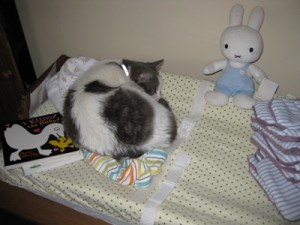 Georgina used to sleep in Harriet’s crib before she was born, and I have this photo of her asleep on Harriet’s change table on top of the sleeper she was due to wear home from the hospital upon her eventual arrival. After the baby was born, we saw Georgina less, partly because Harriet absolutely loved her and manhandled her and would end up with scratches on her face. But she was still our part-time cat, which meant our girl never noticed she didn’t have a pet at all, and that we never had to pay the vet bills as Georgina’s health problems began to mount. Two years ago, we went over to say good-bye to Georgina, whose kidneys and heart were failing. Though that she didn’t die until this afternoon says something about this most amazing cat who thoroughly used up every one of her nine lives. It was always a pleasure to hear her scratching at the door, and we’re all really going to miss her.
Georgina used to sleep in Harriet’s crib before she was born, and I have this photo of her asleep on Harriet’s change table on top of the sleeper she was due to wear home from the hospital upon her eventual arrival. After the baby was born, we saw Georgina less, partly because Harriet absolutely loved her and manhandled her and would end up with scratches on her face. But she was still our part-time cat, which meant our girl never noticed she didn’t have a pet at all, and that we never had to pay the vet bills as Georgina’s health problems began to mount. Two years ago, we went over to say good-bye to Georgina, whose kidneys and heart were failing. Though that she didn’t die until this afternoon says something about this most amazing cat who thoroughly used up every one of her nine lives. It was always a pleasure to hear her scratching at the door, and we’re all really going to miss her.
What I am going to miss the most though is how she used to sit outside on our garden wall, and how when the windows were open in the summer, we’d hear the people outside going by stop to talk to her. Unaware that we could hear their cat murmurings, as they rubbed behind her ears, and spoke in a goo goo voice. And then someone else would come along. “What a sweet cat,” the second person would say, and then the pair would get to talking, conversations drifting upstairs to us. Strangers meeting in the street, people reaching out their fellow human beings, someone leaning down to pat a cat on the wall: all of these signs that there is goodness at the heart of the world.
I’m going to miss that.
I don’t think you can say this about every cat, but Georgina made the city a better place.
January 26, 2015
Not Baklava
 This is not a post apologizing for a lack of updates. If you’ve ever learned anything about blogging from me, it’s probably that such posts are a waste of everybody’s time. What this post is, however, is an apology for my inability to blog while knitting. I can read while knitting; I can do this like a champion. I hold the book open with my feet, or employ my bookstand, and I basically knit this entire balaclava this way, while reading The Inconvenient Indian (and probably looked a bit curious and occupied as I did this during the hour I was waiting for Harriet to finish her dance class on Saturday). I have my limits though: I cannot read while knitting AND drink my tea, which is terrible. And I have yet to figure out how to knit and blog, which is why I have a completed balaclava to show for my Sunday evening instead of a freshly minted blog post. Alas, I think I made the right call, as it’s freezing this morning, and full facial covering goes a long long way.
This is not a post apologizing for a lack of updates. If you’ve ever learned anything about blogging from me, it’s probably that such posts are a waste of everybody’s time. What this post is, however, is an apology for my inability to blog while knitting. I can read while knitting; I can do this like a champion. I hold the book open with my feet, or employ my bookstand, and I basically knit this entire balaclava this way, while reading The Inconvenient Indian (and probably looked a bit curious and occupied as I did this during the hour I was waiting for Harriet to finish her dance class on Saturday). I have my limits though: I cannot read while knitting AND drink my tea, which is terrible. And I have yet to figure out how to knit and blog, which is why I have a completed balaclava to show for my Sunday evening instead of a freshly minted blog post. Alas, I think I made the right call, as it’s freezing this morning, and full facial covering goes a long long way.
It all went a bit wrong, however, once the balaclava was finished. It was 11:30 and everybody was asleep, but I was too excited to keep my success to myself. So I put the balaclava on myself and ran upstairs to wake up Stuart and show him. And I didn’t realize until I’d shaken him awake that it might be unnerving to be pulled from sleep in a darkened room by someone wearing a balaclava… The look of terror in his eyes was like nothing I’ve ever seen before. This morning I tried to reason with him: You knew your spouse was downstairs nearly finished knitting a balaclava. Surely it would be a crazy coincidence if the balaclava-wearer before you was somebody different?
But he insisted such rationales were beyond his mental capacity at that time. He is still a wee bit traumatized.
January 3, 2015
Christmas Vacation
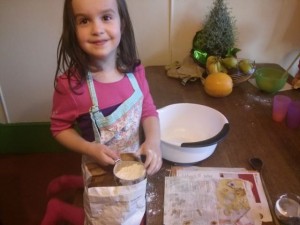 One of many reasons that members of our family are unlikely to ever take the world by storm is that our greatest talents really are for leisure—we’re experts at doing nothing, or just enough of something with requisite amounts of sofa-lying for good measure. We often visit cultural institutions such as museums and art galleries but rarely for more than an hour or two at a time, and never without a trip to the cafe AND the gift shop. Going out for lunch is our main occupation, and we always have dessert. We are really very good at enjoying ourselves, and so the last two weeks have been an absolute pleasure.
One of many reasons that members of our family are unlikely to ever take the world by storm is that our greatest talents really are for leisure—we’re experts at doing nothing, or just enough of something with requisite amounts of sofa-lying for good measure. We often visit cultural institutions such as museums and art galleries but rarely for more than an hour or two at a time, and never without a trip to the cafe AND the gift shop. Going out for lunch is our main occupation, and we always have dessert. We are really very good at enjoying ourselves, and so the last two weeks have been an absolute pleasure.
Two things: first, that I finished things up so that there was no work at all to be done for a week or so, and second, we turned off the internet. For a week, there was no checking of email or twitter, which opened up vast pockets of time in every day for all kinds of things—reading, playing, baking, carol-singing, and doing the Globe & Mail holiday crossword. On Tuesday we bought the newspaper because we were curious about what had gone on in the world, and it was odd to flip through the pages and discover news items we hadn’t heard about elsewhere.
 We spent the first couple of days of our holiday trying in vain to kick the cold that’s been embedded in our heads since the beginning of December. On the Sunday, we went down to the Bay on Queen Street to look at the Christmas windows, which were wonderful, and then went into the store and realized that department stores were the perfect way to reconcile our hatred of shopping malls with the joys of Christmas consumption (glittery lights, perfume smells, shopping bags with string handles, and 1 kilo tins of chocolate. Also, I now own tights without holes in the feet). Speeding home on the subway in time for Iris’s nap and for me to meet friends for an exquisite afternoon tea at Dessert Trends Bistro.
We spent the first couple of days of our holiday trying in vain to kick the cold that’s been embedded in our heads since the beginning of December. On the Sunday, we went down to the Bay on Queen Street to look at the Christmas windows, which were wonderful, and then went into the store and realized that department stores were the perfect way to reconcile our hatred of shopping malls with the joys of Christmas consumption (glittery lights, perfume smells, shopping bags with string handles, and 1 kilo tins of chocolate. Also, I now own tights without holes in the feet). Speeding home on the subway in time for Iris’s nap and for me to meet friends for an exquisite afternoon tea at Dessert Trends Bistro.
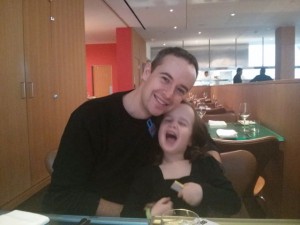 On Monday, we went to the library (because holidaying doesn’t always have to happen on a lavish scale) and then had smoked meat lunch at Caplansky’s Deli. I also went out for dinner with my friends and drank far too much wine. On Tuesday, I don’t think we did anything, partly due to the wine. Throughout all of this, Stuart and I were watching movies and episodes of Midsomer Murders in the evening (because we are 85 years old) and Harriet watched How to Train Your Dragon Two during Iris’s nap times. On Christmas Eve, we went to the Art Gallery to see the Art Spiegelman exhibit and had a lovely brunch at the Frank Restaurant, which we save for the specialist of occasions. On the way home, we picked up our turkey, which we fastened into our stroller. That evening, we had chicken fajitas for Christmas Eve dinner for the 10th year in a row, and left a snack for Santa.
On Monday, we went to the library (because holidaying doesn’t always have to happen on a lavish scale) and then had smoked meat lunch at Caplansky’s Deli. I also went out for dinner with my friends and drank far too much wine. On Tuesday, I don’t think we did anything, partly due to the wine. Throughout all of this, Stuart and I were watching movies and episodes of Midsomer Murders in the evening (because we are 85 years old) and Harriet watched How to Train Your Dragon Two during Iris’s nap times. On Christmas Eve, we went to the Art Gallery to see the Art Spiegelman exhibit and had a lovely brunch at the Frank Restaurant, which we save for the specialist of occasions. On the way home, we picked up our turkey, which we fastened into our stroller. That evening, we had chicken fajitas for Christmas Eve dinner for the 10th year in a row, and left a snack for Santa.
 Christmas was so good. Not only did we not have to leave the house, but we got to have my mom come and visit! The children got excellent presents and had fun playing with them throughout the holidays. I received great books, nice clothes, and other lovely things, including a La Cruset butter dish I’d been hankering after and new Pyrex. We all also received new CDs (because are 85 years old and like to do 20th century things) and so the holiday has been extra-filled with music—some of which was even made after 1987, which is very rare for us. My mom arrived and played with the children (which was not very difficult—she arrived bearing her present of a trunk full of dress-up clothes) while Stuart and I set about cooking the best Christmas dinner ever. The joys of Skype brought us the company of Nana and Granddad in England, and our adorable Alberta relations.
Christmas was so good. Not only did we not have to leave the house, but we got to have my mom come and visit! The children got excellent presents and had fun playing with them throughout the holidays. I received great books, nice clothes, and other lovely things, including a La Cruset butter dish I’d been hankering after and new Pyrex. We all also received new CDs (because are 85 years old and like to do 20th century things) and so the holiday has been extra-filled with music—some of which was even made after 1987, which is very rare for us. My mom arrived and played with the children (which was not very difficult—she arrived bearing her present of a trunk full of dress-up clothes) while Stuart and I set about cooking the best Christmas dinner ever. The joys of Skype brought us the company of Nana and Granddad in England, and our adorable Alberta relations.
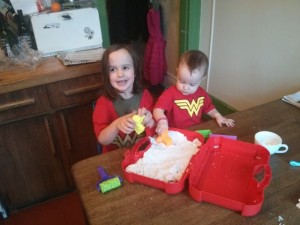 On Boxing Day, we went to the ROM, and partook in a yummy dinner of leftovers—Stuart makes the best turkey sandwiches on earth. Iris also slept until 7am for the first time in her whole life, which was mind-blowing, but also a bit terrible because when her sleep for the subsequent week was abysmal, I wanted to pitch her out the window. The next day, my dad and his partner arrived, and we all had an excellent time with them. And they played with the children while Stuart and I cooked up another very good meal—the greatest turkey pot pie of all time whose secret recipe was duck fat. The day after that, we drove out to my aunt’s in the West end, stopping en-route to buy ice-skates for Harriet and I, which had the potential to be a boondoggle. And then we had a very fun dinner with the best kinds of relations on earth—cousins.
On Boxing Day, we went to the ROM, and partook in a yummy dinner of leftovers—Stuart makes the best turkey sandwiches on earth. Iris also slept until 7am for the first time in her whole life, which was mind-blowing, but also a bit terrible because when her sleep for the subsequent week was abysmal, I wanted to pitch her out the window. The next day, my dad and his partner arrived, and we all had an excellent time with them. And they played with the children while Stuart and I cooked up another very good meal—the greatest turkey pot pie of all time whose secret recipe was duck fat. The day after that, we drove out to my aunt’s in the West end, stopping en-route to buy ice-skates for Harriet and I, which had the potential to be a boondoggle. And then we had a very fun dinner with the best kinds of relations on earth—cousins.
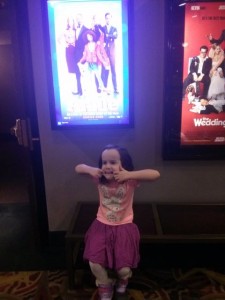 Monday was the best day—Harriet and I headed downtown to meet our friend Erin and watch the new Annie film, which we’d been looking to after avidly viewing its trailers for the past month AND after watching the old Annie every day last summer. The reviews for the new Annie were terrible and all wrong—the movie was wonderful. (That one of the critics referred to the 1982 movie as “an abomination” perhaps suggests that some people had no business reviewing either movie, both of which were masterpieces, in my humble opinion.) We all had such a good time watching it, exuberantly applauding as the credits rolled. And then we met Stuart and Iris and took the subway to Erin’s new house in Bloor West Village, which is very conveniently located near the new Book City (which was bustling and full of wonderful books.)
Monday was the best day—Harriet and I headed downtown to meet our friend Erin and watch the new Annie film, which we’d been looking to after avidly viewing its trailers for the past month AND after watching the old Annie every day last summer. The reviews for the new Annie were terrible and all wrong—the movie was wonderful. (That one of the critics referred to the 1982 movie as “an abomination” perhaps suggests that some people had no business reviewing either movie, both of which were masterpieces, in my humble opinion.) We all had such a good time watching it, exuberantly applauding as the credits rolled. And then we met Stuart and Iris and took the subway to Erin’s new house in Bloor West Village, which is very conveniently located near the new Book City (which was bustling and full of wonderful books.)
On Tuesday, I had to take a certain someone to a dermatologists to have a wart examined, which wasn’t so memorable, except that we got to stop at HMV on the way and buy the Annie soundtrack, a move supported by all members of our household. Iris can now sing “Tomorrow”, which is really something to behold. We also love Sia’s version of “You’re Never Fully Dressed Without a Smile” and the bizarre and catchy “Moonquake Lake”, with its memorable hook—”she’s a fish and he’s a boy.” That night our friends Jennie, Deep and Lilia came for dinner and the best time was had. They were kind enough not to complain about our music selection.
 Rumours of boondoggles were averted on New Years Eve when Harriet and I went skating at Christie Pits—Harriet had the best time and loved it, which was good but also troubling as it means that I have to keep going skating. We went again yesterday and both of us were vastly improved. A third jaunt is scheduled for tomorrow. New Years Eve was our traditional chocolate fondue and ringing in the UK New Year before the children went to bed. And then Stuart and I proceeded to play board games (and ping pong, until Harriet came out of her room and asked us to stop because the pinging and ponging was too noisy) until we were done, and then we went to bed and brought in the new year lit by bed-side lamps, turning away from our respective novels for a moment as the clock ticked over to 2015. Which is the best way to ring in the new that I could ever have imagined.
Rumours of boondoggles were averted on New Years Eve when Harriet and I went skating at Christie Pits—Harriet had the best time and loved it, which was good but also troubling as it means that I have to keep going skating. We went again yesterday and both of us were vastly improved. A third jaunt is scheduled for tomorrow. New Years Eve was our traditional chocolate fondue and ringing in the UK New Year before the children went to bed. And then Stuart and I proceeded to play board games (and ping pong, until Harriet came out of her room and asked us to stop because the pinging and ponging was too noisy) until we were done, and then we went to bed and brought in the new year lit by bed-side lamps, turning away from our respective novels for a moment as the clock ticked over to 2015. Which is the best way to ring in the new that I could ever have imagined.
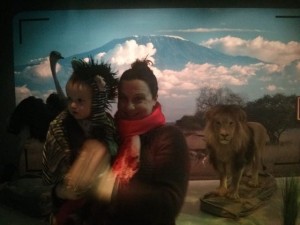 New Years Day was boring—what a wondrous indulgence is that in this day and age? Although we did have our first meal of the year at Fanny Chadwick’s for brunch, which was delicious, and Iris has been transformed into someone who is fairly respectable about restaurant behaviour from all her practice this holiday. And Harriet and I got to play Scrabble for Juniors, which is almost as excellent as spending New Year’s reading in bed. Yesterday we went to the ROM to see the Wildlife Photography exhibit. And yes, more skating. Today we’re doing nothing, which might prove to be a bad idea but feels pretty good from where I sit (on the couch, wearing jogging pants, watching snow falling outside). We’ve kept things a little special with scones with jam and Devonshire cream, because I had a jar of the latter in the fridge and we had to use it up—not the worst task to be charged with.
New Years Day was boring—what a wondrous indulgence is that in this day and age? Although we did have our first meal of the year at Fanny Chadwick’s for brunch, which was delicious, and Iris has been transformed into someone who is fairly respectable about restaurant behaviour from all her practice this holiday. And Harriet and I got to play Scrabble for Juniors, which is almost as excellent as spending New Year’s reading in bed. Yesterday we went to the ROM to see the Wildlife Photography exhibit. And yes, more skating. Today we’re doing nothing, which might prove to be a bad idea but feels pretty good from where I sit (on the couch, wearing jogging pants, watching snow falling outside). We’ve kept things a little special with scones with jam and Devonshire cream, because I had a jar of the latter in the fridge and we had to use it up—not the worst task to be charged with.
 And I’m writing it all down now mostly so that I can remember it, the holiday we were so desperate for and which so delivered. I’m writing it all down because all these ordinary things (libraries and lunches) are so easy to forget, and I don’t want to. I don’t want to forget either that we’re so blessed with friends and family and each other. If how you spend your days are indeed how you spend your life, then these past two weeks are an indication that we’re doing something right. And it’s something to hold on to as the lights of December fade—let the next few months be something more than just a countdown to spring.
And I’m writing it all down now mostly so that I can remember it, the holiday we were so desperate for and which so delivered. I’m writing it all down because all these ordinary things (libraries and lunches) are so easy to forget, and I don’t want to. I don’t want to forget either that we’re so blessed with friends and family and each other. If how you spend your days are indeed how you spend your life, then these past two weeks are an indication that we’re doing something right. And it’s something to hold on to as the lights of December fade—let the next few months be something more than just a countdown to spring.
July 9, 2014
Summer Scenes
Summer is proceeding apace, and we’re all enjoying ourselves. Plus, Stuart met Dan Aykroyd today, so life has officially reached its zenith. I have embarked upon a marathon writing project that requires a commitment of 1000 words a day, which is a lot considering I have only the window of Iris’s nap time for working, and then evenings (because who has ever heard of leisure?), plus have actual jobs that require me to deliver (and hooray for that!). Harriet is at Art Camp this week in the afternoons, the only 5 year old in a group of mainly 12 year olds, so she is basically their pet. Yesterday, she sculpted a stegosaurus. It is a nice break for her from watching Frozen every day between 1:00 and 3:00 while Iris sleeps. On Sunday, we all went to Christie Pits to watch A League of Their Own outside at sunset (which, you will note, is 2 hours past bedtime), and even though everyone else there was wearing rompers, smoking pot and had barely been born when the movie came out, it was an excellent experience. Even Iris stayed awake. Until midnight. It was amazing, but then the next day we were all so tired that I remembered why we weren’t cool spontaneous parents who do things like watch movies in the park with hipsters, but at least we did it once, and now I know. I’ve also managed to get away with not visiting a playground yet during the week, which is fantastic, because Iris is at the worst age to take to such places. All my attempts to sit on a bench and read a book come to naught, which is terrible. Maybe next year? I had forgotten that I hated parks, unless I’d gone with a friend. And speaking of reading books, I’m reading Desert of the Heart by Jane Rule now. The other night I started 4 books and abandoned every one. I am having a problem with patience. Then there was the matter of the books themselves.
June 25, 2014
Better Homes and Gardens
It’s all fine and good to want to give your kids a ’70s summer, but I’m most excited about a date I’ve got scheduled tomorrow that’s more 1950s’ housewife—a martini madness afternoon to celebrate school’s out at the home of the incomparable Nathalie Foy. (“Is this a drop-off party?” asked Harriet, who has anxiety about such things. “No,” I told her. “It’s a grown-ups party. But the kids are allowed to stay.”) Seemed like a good occasion to finally use my 1960 Better Homes and Gardens Dessert Cook Book (which I found on on a curb on Major Street). It’s the most incredible cook book, and with the kind of recipes that alienated 1950s’ housewives from their labour, but provided her with ample time to smoke in and conjure Betty Friedan. These are the recipes the grocery store baked, and there is something to it. I had a busy day today, and wouldn’t have had time to make anything that took more than 10 minutes. I selected the ABC Dessert Salad (they actually called it a salad!) whose ingredients are displayed above. It’s extraordinary! I thought I’d fouled the whole thing up when the whip cream melted all over the rainbow mini marshmallows (because the just-made jello was still hot) but I think it was part of the process. The jello has since set (and before you point it out, it’s FRESH pineapple that won’t set in jello. Canned seems to do just fine) and I had a taste of my salad, and it tasted just like something a Great Aunt would have made. Harriet thinks it sounds delicious.
So we’re being eased into the end of school. Harriet’s playschool finished yesterday, and she’s in morning kindergarten until the end of the week. We had our playschool picnic today, which brought back memories of last year’s, Iris just 3 weeks old and the effort it took for me to sit on the ground. This year, she crawled through dirt and became more filthy than she’s ever been, so the children had a bath as soon as they got home. I think they’re going to be getting up to a lot of that this summer.
On the other end of the food spectrum, we hit the Farmer’s Market this evening. I do so love Harriet at age 5, who is so pleasant to go places with, and Iris is still too little to be completely annoying. And so we go to the market and Harriet says, “Oh, oh, Mommy! The wine seller is here!” and she’s happy because she knows I’m happy (and I’m even happier because this week’s wine seller has a delicious bottle of white wine for $13). And then we get cheese from Monforte Dairy, and strawberries, and raspberries, and garlic scapes, and fresh mint, and turkey sausage, and spinach, and golden beets. The market is beginning to explode with delicious things, and it’s so exciting, the season’s bounty marking its trajectory on our dinner plates. The idea of being home with 2 kids all summer is mildly terrifying, but when I think of it all in terms of tomatoes, corn, and peaches to come, I start to salivate. We will probably be okay.
There will be day camps here and there, and lots of TV. There will be ROM visits, shady trees in the playground, trips to the art gallery, filling up the pool in the backyard, scooter-riding, ice cream drips, library visits, lazy mornings, and lots of freezies. Iris’s naps make our days less wide-open than is ideal, but it also means we all get to siesta, and think that’s a fine thing. (It’s also going to be how I manage to combine my work with childcare. Fingers crossed for this.) There will be the hours of 3:30 to 5:30 to pass, which have been scientifically proven to be the longest 120 minutes in the universe (and I had spent them this spring in the park hanging out with my co-workers. I am going to miss this.) But I am going to enjoy the privilege of a summer with my kids.
We are going to get new freckles. We are going to have fun
June 13, 2014
Friday the 13th
Friday the 13th is a lucky day for me, for it was a Friday exactly eleven and a half years ago that I happened upon the person who, of all the billions of humans on the earth, would become my most beloved. Truly, no one has ever been luckier than I was that day.
And since then, two has become four. We’re still a bit blown away by this. It is possible that we always will be.
June 6, 2014
Market Wine
 I’ve had no blogging mojo this week—sometimes this happens. I have also been incredibly tired, a condition that will not be ameliorated by my attendance on Harriet’s school trip to the High Park Nature Centre this afternoon. With the baby in tow. In my experience, shepherding 20 kids on the subway is one of the more crazy-making circumstances of one’s life. But the weather is beautiful, and I think we’re going to have a great afternoon. Tonight’s plan is wine on the porch, followed by Top of the Lake. The wine is from the Farmers’ Market, which means that the Farmer’s Market (and summer) have returned to us, and also that wine is now permitted to be sold at local markets, and both of these points are incredibly pleasing. So I am looking forward to tonight, though not so much, because I find that evenings that are too anticipated usually result in my cleaning up one of my children’s vomit. Somehow, they just know.
I’ve had no blogging mojo this week—sometimes this happens. I have also been incredibly tired, a condition that will not be ameliorated by my attendance on Harriet’s school trip to the High Park Nature Centre this afternoon. With the baby in tow. In my experience, shepherding 20 kids on the subway is one of the more crazy-making circumstances of one’s life. But the weather is beautiful, and I think we’re going to have a great afternoon. Tonight’s plan is wine on the porch, followed by Top of the Lake. The wine is from the Farmers’ Market, which means that the Farmer’s Market (and summer) have returned to us, and also that wine is now permitted to be sold at local markets, and both of these points are incredibly pleasing. So I am looking forward to tonight, though not so much, because I find that evenings that are too anticipated usually result in my cleaning up one of my children’s vomit. Somehow, they just know.
Also pleasing, I wrote a review of the memoir, Birding With Yeats, by Lynn Thomson in the National Post. It’s a curious book which only became weirder the more I thought about it, which I mean as an endorsement, actually. The fact that I thought about it so much, mostly. I was also reading it at the same time I was reading A Siege of Bitterns and Pluck. So many birds. It inspired me to create a list of these books and more–as ever, putting a bird on it is popular.
And I was thrilled by this review of The M Word in The Winnipeg Review this weekend by Angeline Schellenberg. She got the book exactly, and wrote about it so well. I loved, “Some moms decorate Barbie cakes in their sleep. The M Word is a kind of What to Expect When You’re the Rest of Us” and “A book about motherhood that includes those who never gave birth? Those who’ve been pregnant but never held a child? Halleluiah! Finally: a conversation with no “us versus them.” Here is only “us,” those who desire to “be connected by this understanding of what it is to love and celebrate your children.” The M Word offers what mothers (new and old) need most: to know we’re not alone.” So proud of this, and pleased that this book continues to find its way into the world.
January 31, 2014
Solid
 There is a segment of the population that won’t understand this at all, but sometimes I get bothered because I’m not famous on twitter. (Some of you know exactly what I’m talking about though.) I have never once gone viral. BoingBoing pays me no attention at all, and neither does Reddit, except for the time that I reviewed a Harlequin Romance novel about the mayor of Toronto. And sometime I worry that my lack of twitter fame means that I fundamentally don’t exist, which of course is everything turned inside-out. I know this. It doesn’t take much to remember the truth, which is that if the whole internet disappeared tomorrow, taking my writing career along with it, and I was left with just my little family in the world, I would still have everything. This—our friends and our family—is what really matters. Of everything I ever make, this life we have together is more important than anything else.
There is a segment of the population that won’t understand this at all, but sometimes I get bothered because I’m not famous on twitter. (Some of you know exactly what I’m talking about though.) I have never once gone viral. BoingBoing pays me no attention at all, and neither does Reddit, except for the time that I reviewed a Harlequin Romance novel about the mayor of Toronto. And sometime I worry that my lack of twitter fame means that I fundamentally don’t exist, which of course is everything turned inside-out. I know this. It doesn’t take much to remember the truth, which is that if the whole internet disappeared tomorrow, taking my writing career along with it, and I was left with just my little family in the world, I would still have everything. This—our friends and our family—is what really matters. Of everything I ever make, this life we have together is more important than anything else.
And so I focus on the domestic. Not terribly fashionable, I know, but quite timeless (and celebrated, in all its raw complexity). I love my home, my kitchen at is centre (complete with the obligatory red teapot and bunting). We’ve lived in our apartment for 5 years now, which is the longest I’ve lived anywhere since I was 19 years old. We are committed to renting, and committed to this place, which may not be “a house”, but it is home. And in order to make this home work for the next few years, especially now that we’re a family of four, we had to do something about the kitchen. A kitchen which wasn’t big enough for our round oak table (which had been my childhood table; my mom bought it at an auction years ago), or at least the table was the wrong shape, it took up too much room, and it was far too crowded when everybody was sat at it. And I wanted to be able to have dinner parties. Dinner parties, to me, are integral to home.
 So we had a new kitchen table built. Our friend Nigel Wilson, of Red Lion Workshop, took our measurements and plans (for a rectangular table with benches that could be tucked underneath when not in use) and this morning, with his excellent family, delivered the most important piece of furniture we’ll ever buy. Made of reclaimed oak, it is as solid as it is beautiful. It is everything we dreamed of.
So we had a new kitchen table built. Our friend Nigel Wilson, of Red Lion Workshop, took our measurements and plans (for a rectangular table with benches that could be tucked underneath when not in use) and this morning, with his excellent family, delivered the most important piece of furniture we’ll ever buy. Made of reclaimed oak, it is as solid as it is beautiful. It is everything we dreamed of.
I think that materials are important. I like to think in the long-term. I used to buy furniture in flat packs made out of particle board, and then one day I realized I didn’t want a life made out of such things after all. It is quite likely that I will never buy a kitchen table ever again, and so the extra investment we’ve made now will pay off in the long term, and then to be able to sit down together at a piece of furniture that’s made so well–what a magnificent foundation to build a family life upon.
To contemplate a kitchen table is a loaded thing. It’s still tied up in philosophy for me, because I’m thinking of Woolf and To the Lighthouse, and Mr. Ramsay thinking about a kitchen table when one isn’t there. For me, that kitchen table always looked a lot like this one. But to contemplate a kitchen table is also thinking about the future, about our children sitting on these benches, their little legs growing longer until they one day reach the floor. All the breakfasts and dinners we’ll eat here together, glasses of milk spilled and angry toddlers sent to their room, but the harmonious meals too, the conversations we’ll share. Homework also, once the dinner is cleared away. And birthday parties, play-dough, cookie-baking, hide-and-seek underneath it. Breaking out our portable ping-pong set. The friends who’ll sit around this table with us, friends we might not have even met yet. That we might move one day, and be able to replace the benches with chairs. The amazing privilege of possibility, the assurances of a future, or our faith in such a thing. Which is what a solid kitchen table signifies to me.
The table is pristine for the moment. I was talking to Nigel about this when he was here for lunch. I said, “How do we take care of it?” He said, “You have to use it. The first few rings on the wood, he said, will be painful to see, but you’ll get used to it. Then one day, maybe 20 years now, you’ll look back and you’ll see that mark, and that mark. And you’ll remember everything.”













